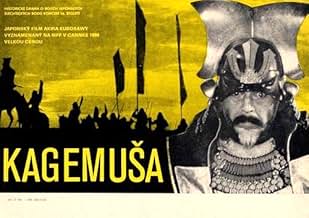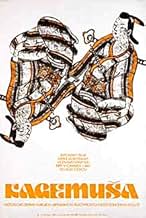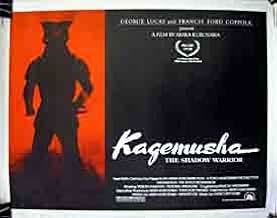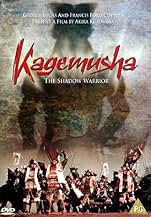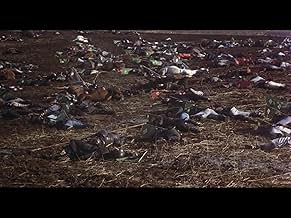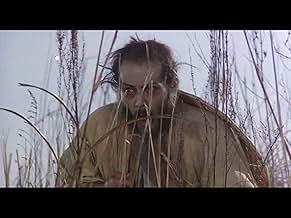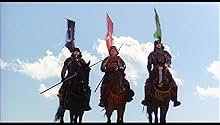CALIFICACIÓN DE IMDb
7.9/10
40 k
TU CALIFICACIÓN
Un ladrón mezquino que se parece a un señor de la guerra samurai es contratado como doble. Cuando el señor de la guerra muere más tarde, el ladrón se ve obligado a tomar armas en su lugar.Un ladrón mezquino que se parece a un señor de la guerra samurai es contratado como doble. Cuando el señor de la guerra muere más tarde, el ladrón se ve obligado a tomar armas en su lugar.Un ladrón mezquino que se parece a un señor de la guerra samurai es contratado como doble. Cuando el señor de la guerra muere más tarde, el ladrón se ve obligado a tomar armas en su lugar.
- Dirección
- Guionistas
- Elenco
- Nominado a 2 premios Óscar
- 20 premios ganados y 5 nominaciones en total
- Dirección
- Guionistas
- Todo el elenco y el equipo
- Producción, taquilla y más en IMDbPro
Opiniones destacadas
I saw the director's cut about twenty years after I first saw the film. Kagemusha is as magnificent now as before, but what has changed in the meantime is my appreciation of the meaning of Shakespeare's plays. The history plays and most of the tragedies were about the political dilemmas facing the new Tudor state. The Elizabethan audience sat on the edge of their seats waiting to see how political order might be restored once it had been set in disarray. The Wars of the Roses sequence culminates in the late political tragedies -- Julius Caesar, Macbeth, Hamlet and Lear. The question is always the same. How is an impersonal modern state possible when its leader is a person, the King? Or is rule by office compatible with the human flaws of the person occupying it? Shakespeare was the client of a conservative aristocratic faction, no rabble-rousing democrat he. But he went so deep into this political question in the course of writing all his plays that he dug deeper into this core issue of modern politics than anyone since.
Kurosawa approaches the same question through the notion of a double,"the shadow of a warrior", Kagemusha. Here the contrast between the office of the political leader and its personal incumbent is brought vividly to life in so many ways. The period is the Japanese equivalent of England's War of the Roses, the transition from feudalism to the beginnings of the modern state. The losing side in this case is the one that tries to resolve the contradiction of personality and office by a subterfuge, a thief masquerading as a lord. The winning side and founder of the Japanese state is the Tokugawa clan. The climactic battle symbolises the passage from traditional to modern warfare, as the horses of the losers are mown down by fusillades of gunfire. The credits run as the corpse of the double crosses a submerged flag whose abstract symbolism shows us which aspects of feudalism the modern state will borrow. Personality is vanquished.
The aesthetic vision animating this movie is incredible. There is so much to look at and admire, perhaps interpret. One striking feature for me was the persistent strong breeze ripping through the banners, a symbol of the winds of change running through 16th century Japan, contemporary to Shakespeare's period. Because this drama was made by and for the modern cinema, in many ways Kurosawa's masterpiece is better than Shakespeare.
Kurosawa approaches the same question through the notion of a double,"the shadow of a warrior", Kagemusha. Here the contrast between the office of the political leader and its personal incumbent is brought vividly to life in so many ways. The period is the Japanese equivalent of England's War of the Roses, the transition from feudalism to the beginnings of the modern state. The losing side in this case is the one that tries to resolve the contradiction of personality and office by a subterfuge, a thief masquerading as a lord. The winning side and founder of the Japanese state is the Tokugawa clan. The climactic battle symbolises the passage from traditional to modern warfare, as the horses of the losers are mown down by fusillades of gunfire. The credits run as the corpse of the double crosses a submerged flag whose abstract symbolism shows us which aspects of feudalism the modern state will borrow. Personality is vanquished.
The aesthetic vision animating this movie is incredible. There is so much to look at and admire, perhaps interpret. One striking feature for me was the persistent strong breeze ripping through the banners, a symbol of the winds of change running through 16th century Japan, contemporary to Shakespeare's period. Because this drama was made by and for the modern cinema, in many ways Kurosawa's masterpiece is better than Shakespeare.
What happens to the doppelganger when the original dies? Does he flitter out of existence or does he find his own. Kagemusha (shadow warrior in Japanese) is the story of a thief who is to be hanged, but is saved by a warlord's brother, Katsuyori Takeda, because of a peculiar resemblance to the king Shingen Takeda. Tatsuya Nakadai brilliantly plays both roles of Shingen and the thief. The thief is trained to fill in as Shingen's double, a position previously played by his brother Katsuyori. Shingen receives a mortal wound during a siege and the Takeda Clan retreat. His dying wish is that he wants his death not to be known for at least three years. Kagemusha eventually acquiesces to the role of not just doubling for the king, but being a figurehead twenty-four hours a day.
The intimate circle of Shingen's family and guard knows about the double. They advise him about how to be like Shingen. He plays the part well. Shingen's son Nobukado, who knows that he is the double, is convinced that his father did this to spite him. Nobukado was passed over as king and that position was granted to Shingen's grandson and Nobukado's son Takemaru as soon as he reaches of mature age. Later in the film, we realize that Shingen did this because Nobukado is too aggressive and is not leader material, not to spite him. The backing of Kagemusha helped Nobukado's one great military victory. Nobukado would forever be in Shingen's shadow.
The relationships between the thief and the Lord's men make this a fascinating film. There is a rich tapestry of multidimensional characters. To some critics the action was too slow. It was not as fast paced as The Seven Samurai or Yojimbo. I think it is a mature film from a maturing director who would go on to direct another of my favorite films Ran. This film was nominated for two academy awards and would co-win the grand prize at the Cannes Film Festival. The juxtaposition between the titanic and minute is a favorite concept of Kurosawa. Stolid men have tragic faults. Beggars can be kings.
Kurosawa is one of the world's most famous directors. Yet in the 1980's, he did not get much respect from his home country Japan. He had not had released a film since 1975 -- the beautiful and brilliant Dersu Uzala and he was reportedly suicidal. This film would not have been made if it were not for George Lucas and Francis Ford Coppola whom helped finance this film. Lucas has always been a big fan of Kurosawa. Star Wars was partially influenced by Kurosawa's film The Hidden Fortress. I am a big fan of Kurosawa too. His films always have the most beautiful cinematography, intricate plots and grand characters. Kagemusha is no exception.
The intimate circle of Shingen's family and guard knows about the double. They advise him about how to be like Shingen. He plays the part well. Shingen's son Nobukado, who knows that he is the double, is convinced that his father did this to spite him. Nobukado was passed over as king and that position was granted to Shingen's grandson and Nobukado's son Takemaru as soon as he reaches of mature age. Later in the film, we realize that Shingen did this because Nobukado is too aggressive and is not leader material, not to spite him. The backing of Kagemusha helped Nobukado's one great military victory. Nobukado would forever be in Shingen's shadow.
The relationships between the thief and the Lord's men make this a fascinating film. There is a rich tapestry of multidimensional characters. To some critics the action was too slow. It was not as fast paced as The Seven Samurai or Yojimbo. I think it is a mature film from a maturing director who would go on to direct another of my favorite films Ran. This film was nominated for two academy awards and would co-win the grand prize at the Cannes Film Festival. The juxtaposition between the titanic and minute is a favorite concept of Kurosawa. Stolid men have tragic faults. Beggars can be kings.
Kurosawa is one of the world's most famous directors. Yet in the 1980's, he did not get much respect from his home country Japan. He had not had released a film since 1975 -- the beautiful and brilliant Dersu Uzala and he was reportedly suicidal. This film would not have been made if it were not for George Lucas and Francis Ford Coppola whom helped finance this film. Lucas has always been a big fan of Kurosawa. Star Wars was partially influenced by Kurosawa's film The Hidden Fortress. I am a big fan of Kurosawa too. His films always have the most beautiful cinematography, intricate plots and grand characters. Kagemusha is no exception.
After spending a decade (or so) in solitary confinement from the Japanese Film Industry Akira Kurosawa returns to make his semi-masterpiece "Kagemusha", which he called a dress-rehearsal for "Ran", made in 1985.
Kagemusha is, probably, the best example of cinematic overkill where nobody actually cares. Cinematic overkill is when someone constructs a complex multi-layered movie, stage epic-battles, introduce likeable and complex characters without having a very complicated message. The message of "Kagemusha" is simply this: If you pretend long enough to be something else you'll become it. Too simple, maybe, for what's delivered.
Not that "Kagemusha" is a bad movie. It's haunting, it's spectacular and it's just great. I keep thinking about it over and over. I can't get it out of my head. Simply put "Kagemusha" is a masterpiece, albeit one up for debate. Not all Kurosawa fans would like it, but that's they're business. Personally, this is one of the movies currently that I'd really like to see again.
PS: Thank goodness for George Lucas and Francis Ford Copolla who funded this movie.
Kagemusha is, probably, the best example of cinematic overkill where nobody actually cares. Cinematic overkill is when someone constructs a complex multi-layered movie, stage epic-battles, introduce likeable and complex characters without having a very complicated message. The message of "Kagemusha" is simply this: If you pretend long enough to be something else you'll become it. Too simple, maybe, for what's delivered.
Not that "Kagemusha" is a bad movie. It's haunting, it's spectacular and it's just great. I keep thinking about it over and over. I can't get it out of my head. Simply put "Kagemusha" is a masterpiece, albeit one up for debate. Not all Kurosawa fans would like it, but that's they're business. Personally, this is one of the movies currently that I'd really like to see again.
PS: Thank goodness for George Lucas and Francis Ford Copolla who funded this movie.
I have seen nearly all of Akira Kurosawa's films, so my opinion shouldn't be completely ignored. Although I am in the distinct minority, I didn't particularly like KAGEMUSHA. Yes, it was big and beautiful and had great scope but it was also emotionally sterile and bore little resemblance to Kurosawa's earlier, more famous works. The same, by the way, can be said about RAN. Both films had relatively HUGE budgets but the dialog and connectedness between the characters was lacking. As a result, I felt pretty bored when I watched both of them--especially this film.
So, if you compare these two movies with THE 7 SAMURAI or YOJIMBO, for example, they seem VERY different. These older films, though not filmed in color, had a greater sense of humanity about them--great importance was placed on the INTERRELATIONSHIPS between the characters AND the camera work was very different, with more closeups and a more intimate feel. So, while RAN and KAGEMUSHA were pretty to look at, I felt much more detached from them and cared much less about the characters. I really think the problem with these two movies, and the reason I like them less than the average Kurosawa film, was that the big budget in these later films actually HURT them, as too much emphasis was placed on effects and dialog was purely secondary.
So, in summary, I am the odd-ball that didn't love this film. You will probably disagree and might be tempted to mark my review as "not helpful", as the reviews on IMDb are generally glowing. But having seen many Japanese films, I can't help but feel there are better films out there waiting to be seen. Most any other Kurosawa film, and films by other great directors (such as THE SAMURAI TRILOGY, the films of Yasujiro Ozu) are more appealing to me. I think the popularity of this film is in part due to its having been seen in theaters by more Westerners than any other of Kurosawa's films--SEEK OUT HIS EARLIER AND MID-CAREER FILMS--they are better and far more emotionally involving.
So, if you compare these two movies with THE 7 SAMURAI or YOJIMBO, for example, they seem VERY different. These older films, though not filmed in color, had a greater sense of humanity about them--great importance was placed on the INTERRELATIONSHIPS between the characters AND the camera work was very different, with more closeups and a more intimate feel. So, while RAN and KAGEMUSHA were pretty to look at, I felt much more detached from them and cared much less about the characters. I really think the problem with these two movies, and the reason I like them less than the average Kurosawa film, was that the big budget in these later films actually HURT them, as too much emphasis was placed on effects and dialog was purely secondary.
So, in summary, I am the odd-ball that didn't love this film. You will probably disagree and might be tempted to mark my review as "not helpful", as the reviews on IMDb are generally glowing. But having seen many Japanese films, I can't help but feel there are better films out there waiting to be seen. Most any other Kurosawa film, and films by other great directors (such as THE SAMURAI TRILOGY, the films of Yasujiro Ozu) are more appealing to me. I think the popularity of this film is in part due to its having been seen in theaters by more Westerners than any other of Kurosawa's films--SEEK OUT HIS EARLIER AND MID-CAREER FILMS--they are better and far more emotionally involving.
Akira Kurosawa is certainly one of the most important directors who ever lived. Most of his most famous films were made in the 50s and 60s. Rashomon, Ikiru, Yojimbo, and The Seven Samurai may be the four most famous films he made, and they were all in black and white. That format was wonderful. His films had a definitive look in that era.
I would like to suggest, though, that he was the single best director of the color image who has existed thus far (whose work I am familiar with). I have only seen two of his color films (I don't even know how many he made), this film and Ran, but his sense of color in these two films is exquisite. I had to pause it several times during Kagemusha just to stare at the beautiful composition.
I personally think that Kurosawa's talents rested mainly in the technical aspects of his films rather than the content (and I'm sure many people would argue against me here). So as for the film itself, I'd give it a 9/10 for two reasons. I was only emotionally involved during small sections of the film (the end was particularly powerful), and the story was somewhat difficult to follow (I was confused during Yojimbo and The Seven Samurai, too). I prefer Ran to this film (and to all the other films of his I've seen, which include Rashomon, The Seven Samurai, and Yojimbo). Still, Kagemusha is very good.
I would like to suggest, though, that he was the single best director of the color image who has existed thus far (whose work I am familiar with). I have only seen two of his color films (I don't even know how many he made), this film and Ran, but his sense of color in these two films is exquisite. I had to pause it several times during Kagemusha just to stare at the beautiful composition.
I personally think that Kurosawa's talents rested mainly in the technical aspects of his films rather than the content (and I'm sure many people would argue against me here). So as for the film itself, I'd give it a 9/10 for two reasons. I was only emotionally involved during small sections of the film (the end was particularly powerful), and the story was somewhat difficult to follow (I was confused during Yojimbo and The Seven Samurai, too). I prefer Ran to this film (and to all the other films of his I've seen, which include Rashomon, The Seven Samurai, and Yojimbo). Still, Kagemusha is very good.
¿Sabías que…?
- TriviaMuch of the film recounts actual historical events, including Shingen's death and the two-year secret, and the climactic Battle of Nagashino in 1575. Those scenes are also modeled closely on detailed accounts of the battle.
- ErroresIn the final battle there are at least 100 riflemen shown firing their matchlock rifles in volleys. The smoke generated by the matchlocks almost immediately dissipates. This indicates a more modern gunpowder was used in the matchlocks as the historically correct black powder load would blanket the battlefield with thick smoke after a handful of volleys.
- Citas
Nobukado Takeda: The shadow of a man can never stand up and walk on its own.
- Versiones alternativasIn the original Japanese version, there are 20 minutes featuring Kenshin Uesugi. For some reason, these scenes were cut out of the USA version.
- ConexionesFeatured in A.K. (1985)
Selecciones populares
Inicia sesión para calificar y agrega a la lista de videos para obtener recomendaciones personalizadas
Detalles
- Fecha de lanzamiento
- Países de origen
- Idioma
- También se conoce como
- Kagemusha: The Shadow Warrior
- Locaciones de filmación
- Himeji Castle, Himeji, Japón(Nobunaga's castle)
- Productoras
- Ver más créditos de la compañía en IMDbPro
Taquilla
- Presupuesto
- USD 6,000,000 (estimado)
- Total en EE. UU. y Canadá
- USD 4,000,000
- Total a nivel mundial
- USD 4,018,532
- Tiempo de ejecución
- 3h(180 min)
- Color
- Mezcla de sonido
- 4-Track Stereo(original version)
- Relación de aspecto
- 1.85 : 1
Contribuir a esta página
Sugiere una edición o agrega el contenido que falta


